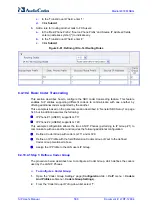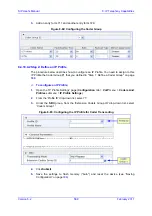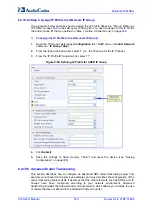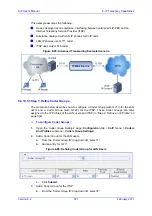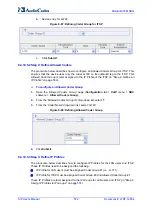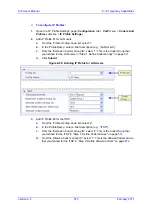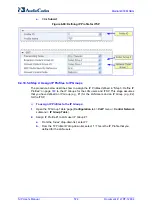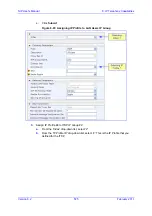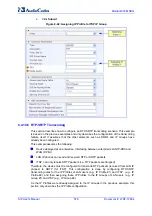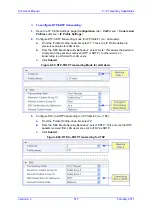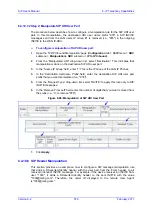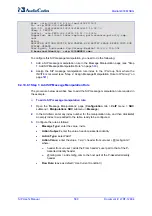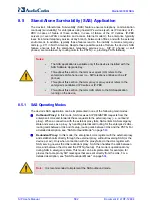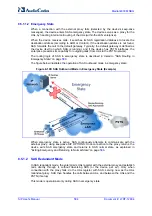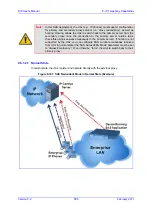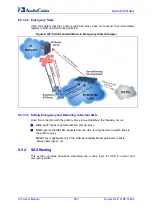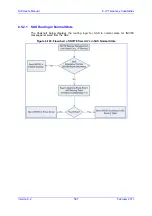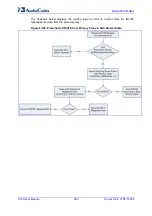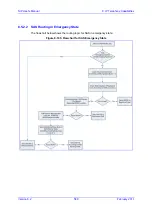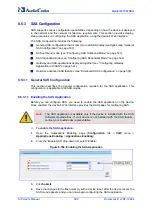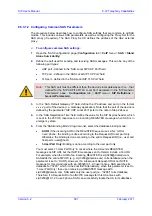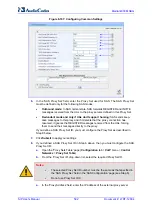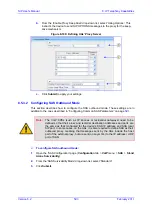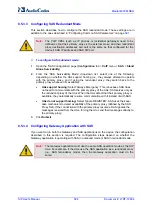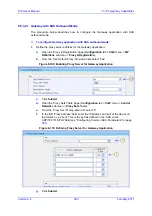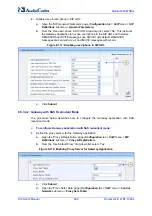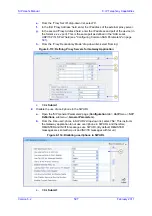
SIP User's Manual
582
Document #: LTRT-12804
Mediant 800 MSBG
8.5
Stand-Alone Survivability (SAS) Application
The device's Stand-Alone Survivability (SAS) feature ensures telephony communication
continuity (survivability) for enterprises using hosted IP services (such as IP Centrex) or IP-
PBX in cases of failure of these entities. In case of failure of the IP Centrex, IP-PBX
servers (or even WAN connection and access Internet modem), the enterprise typically
loses its internal telephony service at any branch, between its offices, and with the external
environment. In addition, typically these failures lead to the inability to make emergency
calls (e.g., 911 in North America). Despite these possible points of failure, the device's SAS
feature ensures that the enterprise's telephony services (e.g., SIP IP phones or soft
phones) are maintained, by routing calls to the PSTN (i.e., providing PSTN fallback).
Notes:
•
The SAS application is available only if the device is installed with the
SAS Software Upgrade Key.
•
Throughput this section, the term
user agent
(UA) refers to the
enterprise's LAN phone user (i.e., SIP telephony entities such as IP
phones).
•
Throughout this section, the term
proxy
or
proxy server
refers to the
enterprise's centralized IP Centrex or IP-PBX.
•
Throughout this section. the term
SAS
refers to the SAS application
running on the device.
8.5.1
SAS Operating Modes
The device's SAS application can be implemented in one of the following main modes:
Outbound Proxy:
In this mode, SAS receives SIP REGISTER requests from the
enterprise's UAs and forwards these requests to the external proxy (i.e., outbound
proxy). When a connection with the external proxy fails, SAS enters SAS emergency
state and serves as a proxy, by handling internal call routing for the enterprise's UAs -
routing calls between UAs and if setup, routing calls between UAs and the PSTN. For
a detailed description, see ''SAS Outbound Mode'' on page
Redundant Proxy:
In this mode, the enterprise's UAs register with the external proxy
and establish calls directly through the external proxy, without traversing SAS (or the
device per se'). Only when connection with the proxy fails, do the UAs register with
SAS, serving now as the UAs redundant proxy. SAS then handles the calls between
UAs, and between the UAs and the PSTN (if setup). This mode is operational only
during SAS in emergency state. This mode can be implemented, for example, for
proxies that accept only SIP messages that are sent directly from the UAs. For a
detailed description, see ''SAS Redundant Mode'' on page
Note:
It is recommended to implement the SAS outbound mode.
Summary of Contents for Mediant 800 MSBG
Page 2: ......
Page 366: ...SIP User s Manual 366 Document LTRT 12804 Mediant 800 MSBG Reader s Notes ...
Page 372: ...SIP User s Manual 372 Document LTRT 12804 Mediant 800 MSBG Reader s Notes ...
Page 390: ...SIP User s Manual 390 Document LTRT 12804 Mediant 800 MSBG Reader s Notes ...
Page 404: ...SIP User s Manual 404 Document LTRT 12804 Mediant 800 MSBG Reader s Notes ...
Page 616: ...SIP User s Manual 616 Document LTRT 12804 Mediant 800 MSBG Reader s Notes ...
Page 636: ...SIP User s Manual 636 Document LTRT 12804 Mediant 800 MSBG Reader s Notes ...
Page 652: ...SIP User s Manual 652 Document LTRT 12804 Mediant 800 MSBG Reader s Notes ...
Page 886: ...SIP User s Manual 886 Document LTRT 12804 Mediant 800 MSBG Reader s Notes ...

